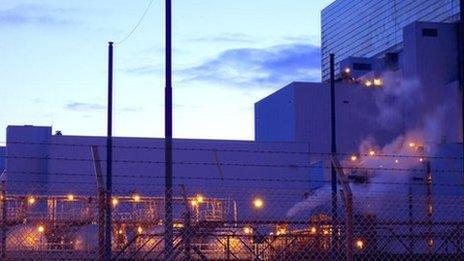Scotland's nuclear stations could stay open
- Published

Torness nuclear power station could stay in operation
Scotland's two nuclear power stations could be given an extended lifespan, as part of new Scottish government plans for electricity generation.
Ministers have said they will not block applications by operator EDF to continue running Torness and Hunterston beyond their current licences.
The SNP administration has been opposed to replacing nuclear power stations.
Keeping older ones in operation is seen as a way of retaining sufficient generating power in Scotland.
The Scottish government has published its plans for renewable energy to provide 100% of Scotland's electricity needs by 2020.
The plan is to ensure there is a supply in place when renewable energy is not being generated.
The new strategy draws together government thinking since it raised its targets from 80% of demand within eight years.
It is intended to balance ambitious targets, removing carbon from electricity generation by 2030, while keeping customer costs under control.
The strategy does not consider the implications of Scotland becoming independent.
The policy authors are keen to emphasise what the target means, and that it is "extremely challenging": "This target does not mean that Scotland will be 100% dependent on renewables generation.
"Renewables will form part of a wider, balanced electricity mix, with thermal generation continuing to play an important role."
It goes on: "Our 2020 target is a challenge to the energy supply sector, to our renewables industry and innovators, and to Scotland's communities.
"It is a both a statement of intent and a rallying call, embodying our firm belief that Scotland can and must exploit its huge renewables potential to the fullest possible extent - to help meet demand here and across Europe.
"It is as much about the value and importance of the journey as it is about the destination".
Part of the calculation is that at least 11% of heat (up from less than 3% at present) will come from renewable sources by 2020, and 10% of transport fuel.
While it is expected there will be an increased demand for electric power as heating and transport are converted to electricity, total Scottish demand for electricity is targeted for a fall of 12%.
Despite opposition to nuclear power, the document said the Scottish government will not use its powers to block an extension to operations at Torness in East Lothian, which is licensed to 2023, and Hunterston in Ayrshire, which is currently scheduled to close in 2016.
The Electricity Generation Policy Statement (EGPS) says: "Before agreeing to a life extension, the Office for Nuclear Regulation will need to be satisfied that high levels of safety and security could be maintained over the planned lifetime of the installation.
Coal plants
"Subject to the relevant safety cases being made, the Scottish Government would not oppose operating life extension applications at these sites."
Ministers are proposing that all large coal plants will be required to capture carbon emissions by 2025, and new ones from 2020 onwards.
This is to cut emissions in line with targets and requirements.
The two big plants are scheduled to close by then, with Cockenzie in East Lothian closing in 2015, with a planned conversion to new gas turbines, while Longannet in Fife is licensed to keep operating until around 2020.
Longannet was the trial site for carbon capture and storage, a technology that is yet to be proven commercially, but funding for that was withdrawn by the UK Government last October.
Much of the EGPS is focussed on trying to make carbon capture viable, with the prospect of 5000 jobs and £3.5bn in benefits for the Scottish economy.
But there is a concession to sceptics about the government's ambitious targets, and the need to secure reliable baseload capacity to ensure power supplies when the wind drops and turbines stop working.
Fergus Ewing, the energy minister, commented: "We know our target is technically achievable.
"Scotland already leads the world in renewable energy, and we have the natural resources and the expertise to achieve so much more".
- Published17 November 2011
- Published16 December 2010